Iranian Activists Condemn 13-Year House Arrest As ‘Gradual Murder’
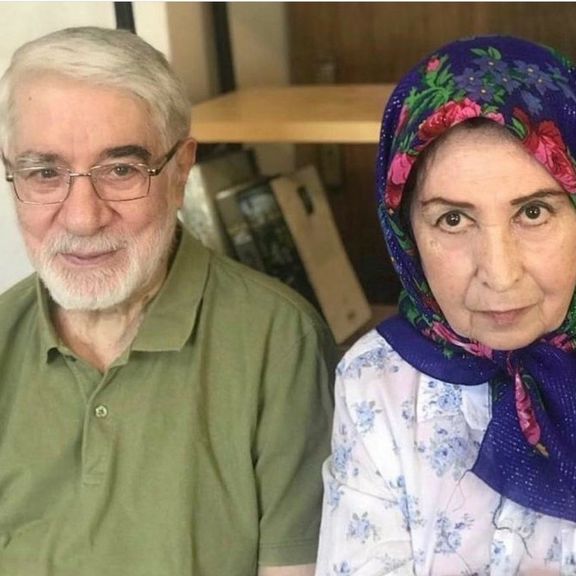
Hundreds of Iranian activists have emphasized that the 13-year-long house arrest of three Green Movement protest leaders is a gradual form of murder.

Hundreds of Iranian activists have emphasized that the 13-year-long house arrest of three Green Movement protest leaders is a gradual form of murder.
The Iranian Green Movement refers to a political movement that arose after the June 12, 2009 disputed presidential election and lasted until early 2010, in which protesters demanded the annulment of the highly controversial re-election of Mahmoud Ahmadinejad .
The green color was initially used as the symbol of Mir-Hossein Mousavi's campaign, but after the election it became the symbol of unity and hope for those who demanded a real and transparent tabulation of results.
Mousavi, a former prime minister and his wife Zahra Rahnavard, the leaders of the movement have been under house arrest, living in seclusion under the control of security forces at their home since 2011, as Supreme Leader Ali Khamenei saw their protest as a challenge to his regime.
Over 570 political, social, cultural, and civil activists released a statement on Saturday expressing concerns about the continuation of the house arrest of Mousavi, Rahnavard, and Karroubi.
They also expressed concern about imprisonments, sudden deaths, and hunger strikes of political and ideological prisoners on the anniversary of Woman, Life, Freedom protests.
“The 13-year-long house arrest of these protesting political leaders, which began with a violation of the law, has continued inhumane methods and, as a result of increasing pressure, is currently leading to a form of gradual murder,” reads the statement.
The signatories of the letter emphasized that it is the government's responsibility to immediately release the three figures who are being held in an unjust manner without trial.
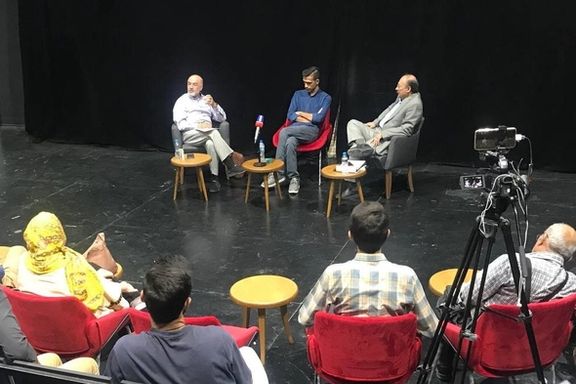
An Iranian academic has criticized officials for denying the country's volatility, amid economic and other crises and a restless population ready to protest.
The Khabar Online website in Tehran has reported a debate between the two academics: Bijan Abdolkarimi, a lecturer on philosophy, and Alireza Shojaivand, a professor of sociology at the Students' House. It appears that many other academics in Iran share Abdolkarimi's critical perspective on the situation.
Abdolkarimi said that he has sent a written version of his criticism to Supreme Leader Ali Khamenei. Shojaivand, on the other hand, charged that some of the regime's critics fabricate comments about the situation's volatility.
He argued that the societal agitations function like a fever, serving as indicators of underlying issues and warning signals for everyone. Abdolkarimi used the same analogy to emphasize that denying these problems could potentially lead to the spread of infection within society.
Abdolkarimi mentioned that he had sent a written version of his criticism to Supreme Leader Ali Khamenei.
Shojaivand, on the other hand charged that many critics portray the agitations as signs of social collapse. However, he noted that while they point out the problem, they often fall short of offering solutions. He even accused some critics of exacerbating societal agitations.
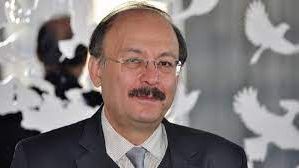
Abdolkarimi largely agreed with Shojaivand's views but disagreed with the accusation against some critics. He also cautioned his fellow academic about polarizing academia by dividing it into two opposing groups: opposition and regime supporters. He stressed that “both of these groups are valuable assets for the country,” also suggesting that laymen may understand societal issues better than experts.
Abdolkarimi stressed that "when people feel a state of strangulation in the society, experts and politicians need to look for the root cause of that feeling." The academic mentioned that he provided his views two months ago when a government body called on a hundred experts to discuss the situation concerning an approaching crisis on the anniversary of Mahsa Amini's death. However, he expressed uncertainty about what happened to his contributions.
Abdolkarimi criticized both the critics, whom he referred to as "the opposition," and the other side of the argument, which he called "the revolutionaries," for lacking a theoretical foundation in their narratives. He also noted shortcomings in the foundational idea of the Guardianship of the Jurisconsult -or the institutions of the Supreme Leader - which underpins the Islamic Republic's political structure.
Abdolkarimi further criticized the Iranian government for politicizing almost everything, furthering an ideological policy, opposition to modernity and other problems including populism, the gap between the people and the government, authoritarianism, and a militarism that hand over the universities and even football clubs to the revolutionary guards (IRGC).
Abdolkarimi further criticized the Iranian government for politicizing nearly every aspect of society, promoting an ideological policy, opposing modernity, and facing issues such as populism, a growing gap between the people and the government, authoritarianism, and involving the Revolutionary Guard in institutions like universities and even football clubs.
He acknowledged that the Islamic Republic faces a succession crisis but warned against oversimplifying the prediction of regime collapse. Shojaivand mentioned he had answers to these issues but preferred to discuss them in another session. For the time being, he pointed out that there are people in Iran unhappy with the government's performance, but this doesn't necessarily turn them into opposition members. Additionally, he cautioned against misinterpreting the regime's willingness to engage in global processes as authoritarianism.

Iran's Minister of Education has replaced over 20,000 principals in a move that many see as an attempt to purge schools after nationwide protests.
Reza Morad Sahraei revealed on Thursday that 7,000 schools have been earmarked for participation in the “transformation plan”, after many school students took part in anti-government protests.
The plan will be implemented in 5,000 schools in the current Iranian year ending on March 20, 2024, with a commitment to continue the changes, added Sahraei.
It appears that the purge, which began with universities, has now extended to schools. Since the commencement of anti-regime protests in September 2022, the Iranian government has dismissed scores of university professors.
Etemad, a prominent reformist daily in Iran, published an article in August highlighting 52 professors who have faced dismissal, forced retirement, or teaching restrictions.
Earlier in August, the same publication released a list of 157 tenured professors who were terminated due to their critical and dissenting views, spanning from 2006 to the end of August 2023. The extensive purging effort encompasses not only tenured faculty but also non-tenured lecturers who are being replaced by professors with a more "religious" and "revolutionary" orientation.
The notion of "political purification," as described in Iranian media, goes beyond educational institutions and encompasses various other organizations and institutions where regime hardliners are sidelining their rivals. The term "purification" was coined by former Parliament Speaker Ali Larijani to describe the actions of the ultraconservative allies of President Raisi, who seek to consolidate government power by marginalizing other politicians and officials.
According to some reports, President Raisi intends to introduce 15,000 "revolutionary" professors into academic faculties nationwide.
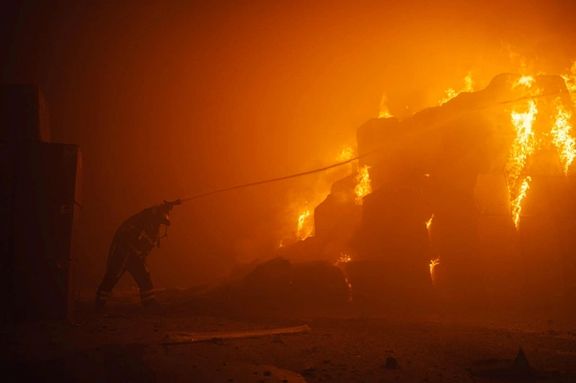
Amid accusations of Iran supplying military equipment and drones to Russia, President Ebrahim Raisi has criticized financial and military aid to Ukraine.
In an interview with RT Spanish, Raisi attributed the conflict between Moscow and Kiev to NATO's ambition to expand its influence into multiple countries and establish military bases not only in Ukraine but in various other counties.
Raisi reiterated Tehran's claim that "Those providing aid, including financial and military support to Ukraine, are not seeking an end to the war but rather its prolongation at any cost." The allegations surfaced despite ongoing reports from both Kiev and US officials about Iran's military support to Russia.
Iran, however, continues to deny any involvement in providing drones to Russia. Foreign Minister Hossein Amir-Abdollahian earlier reiterated, "Our stance on the Ukraine issue is clear and transparent, and our foreign policy remains unaffiliated with any party."
Sor far, the Ukrainian Air Force has reported downing hundreds of Iranian-made combat and kamikaze drones, specifically Shahed-131 and Shahed-136, deployed by Russia in its offensive. Multiple countries, including the United States, the United Kingdom, the European Union, Australia, and New Zealand, have imposed several rounds of sanctions on Iran due to alleged drone provision in the Ukraine conflict.
Raisi also emphasized the growing relationship and cooperation between Iran and Russia across various domains. He concluded, "Today's challenges have not impacted our strategic relationship with Russia, which remains unaltered by global developments."
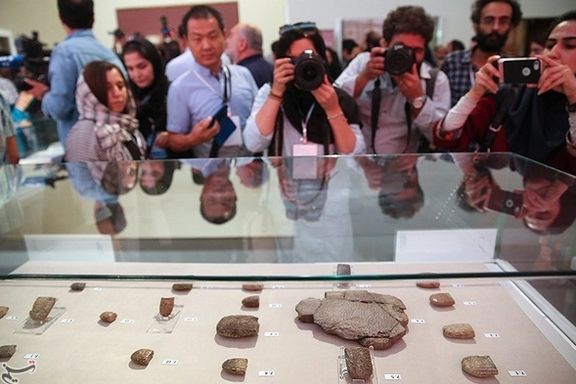
Iran has received thousands of Achaemenid-era clay tablets from the United States in the latest such instalment after decades of efforts to repatriate the antiquities.
Touted by the state media as “souvenirs of president's US visit,” a total of 3,506 Achaemenid tablets were returned home by the plane carrying President Ebrahim Raisi, who addressed the 78th session of the United Nations General Assembly during his visit to New York.
“The tablets of the Achaemenid Empire, which were being kept in the United States and the Center for East Asian Studies at the University of Chicago (CEAS) for 84 years, were repatriated to Iran. The tablets were originally set to stay there for three years for study purposes,” Raisi told reporters upon arrival at Tehran’s Mehrabad Airport.
These tablets, on loan from Iran to the Oriental Institute of the University of Chicago since 1935, were transported in nine 75kg boxes. The university had received approximately 30,000 tablets or tablet fragments, which were reportedly produced during the reign of Darius I, commonly known as Darius the Great. He served as the third King of Kings of the Achaemenid Empire, reigning from 522 BC until his death in 486 BC. These artifacts were discovered at the ruins of Persepolis, the capital of the Persian Achaemenid Empire (6th – 4th c. BC) in southern Iran.
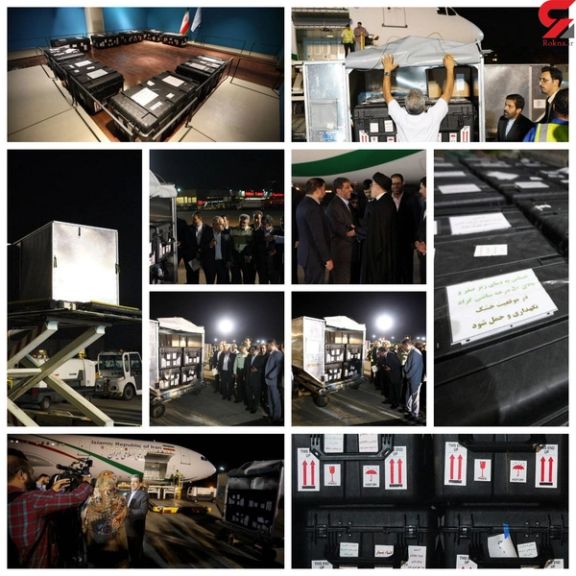
In August, Iran’s deputy cultural heritage minister announced that the United States had agreed to return over 20,000 Achaemenid clay tablets to Iran within months. Ali Darabi said, “More than 20,000 Achaemenid tablets belonging to Persepolis will be returned from the US by the end of this year.”
The last batch of these artifacts returned to Iran in 2019, consisting of 1,783 objects from Chicago’s Field Museum of Natural History. The fate of these ancient Persian artifacts was determined by a US Supreme Court ruling in 2018, which allowed Iran to have the tablets that were initially blocked due to a court case initiated by American survivors of the 1997 Hamas terror attack in Israel. However, the reimposition of US sanctions on the Islamic republic since August 2018 complicated the return of the antiquities to Iran.
A significant portion of the tablets was returned in three batches between 1948 and 2004, before the court ruling. The plaintiffs had demanded the seizure of the tablets and their sale in exchange for the $71.5 million that Iran was ordered to pay in the case.
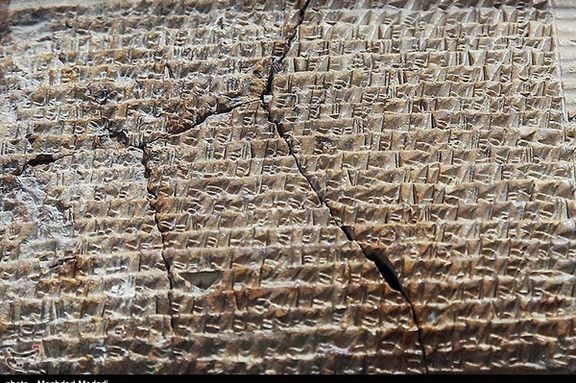
Following the delivery of the last batch, Matthew Stolper, Professor Emeritus at the Oriental Institute, emphasized the scientific significance of these works. He highlighted that the artifacts had contributed to a better understanding of “how (Achaemenid) society was organized and how basic institutions of control and support worked.” Stolper also mentioned that they had learned the names of some important individuals in the ruling class and gained insights into how they governed.
Currently, the regime seems reluctant to acknowledge the ancient Iranian empire – once the largest empire in the world – amid rising popular support for exiled Prince Reza Pahlavi, the heir to Iran’s last royal dynasty that ruled for almost 54 years between 1925 and 1979, who has become a leading opposition figure in recent years.
Since 2017, the Islamic Republic has implemented security measures and even blocked roads leading to Pasargadae and Persepolis to prevent people from visiting these Achaemenid sites, fearing that visitors of these monarchist symbols might hold protests against the clerical regime. These measures have intensified since October 2016 when thousands of people gathered at the historical site and chanted antigovernment slogans, such as "Iran is our homeland, Cyrus is our father."
Since news about the clay tablets has emerged, a large number of Iranians are voicing concern online that the regime may auction off these pieces of Iranian national heritage or destroy them with mismanagement. The administration of former Iranian President Mahmoud Ahmadinejad and the Revolutionary Guard are accused of the bagging carpets of Saadabad Palace in Tehran.
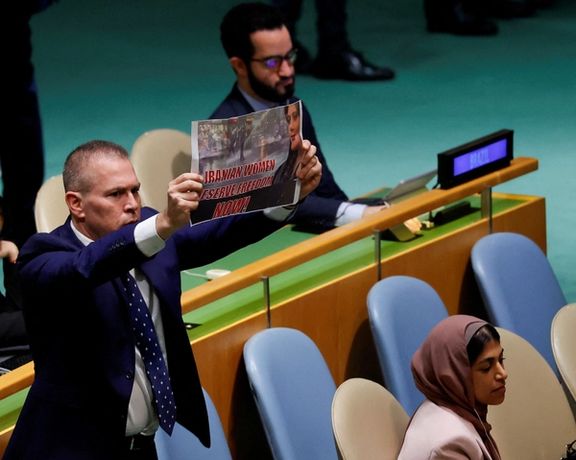
Israel's UN ambassador photographed the poster of an Iranian demonstrator outside the UN in New York and held it up during the speech of Iran's president Ebrahim Raisi.
The photograph used by Israel’s UN envoy, Gilad Erdan, on Tuesday to protest the “Butcher of Tehran” Raisi in the United Nations General Assembly electrified social media and swathes of the Iranian diaspora.
Hamid Charkhkar, a professor of biomedical engineering at Case Western University, told Iran International that "My wife, Fatemeh, and I came from Ohio to New York to join other Iranian-Americans protesting against Raisi and his delegation. It felt unjust that he, a man responsible for deaths thousands of innocent Iranians, was given a US visa for the UN General Assembly. I had a sign with Mahsa Amini's picture on it, saying 'Iranian women deserve freedom now.' To our surprise, Israel's UN Ambassador, Gilad Erdan, walked up to our protest, clearly showing support for our cause."
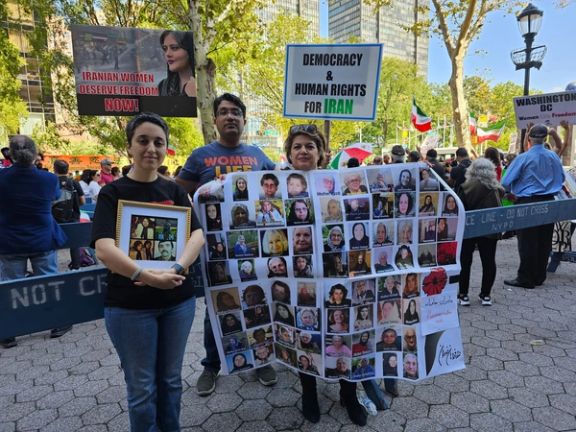
Charkhkar added “He was drawn to my sign and asked if he could take a photo of it. Later, we saw on Twitter that he held my sign during Raisi's UN speech. I want to thank Ambassador Erdan. He helped raise the voices of Mahsa and many young Iranian youth who suffered under the Islamic regime in Iran.
Charkhkar is a member of the Alliance Against Islamic Regime of Iran Apologists (AAIRIA) that seeks to the dismissal of the Iranian regime’s former UN ambassador, Mohammad Jafar Mahallati, from his academic post at Oberlin College in Ohio. Amnesty International has repeatedly accused Mahallati of covering up crimes against humanity with respect to the 1988 massacre.
Iran International reported that Erdan was the only diplomat to walk out during Raisi’s speech. The US government sanctioned Raisi for his role in the massacres of Iranians in 1988 and 2019.






